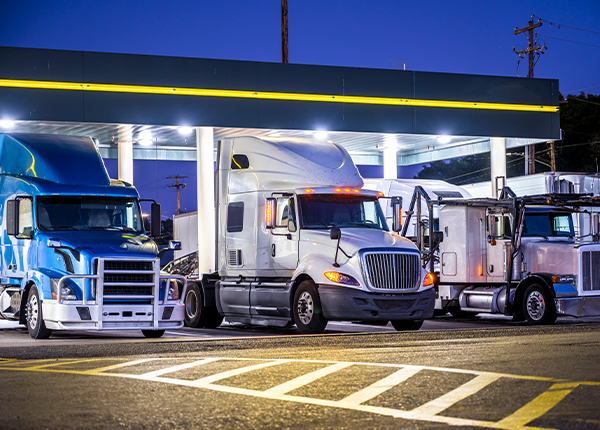
Insurance Implications of Integrating Electric Vehicles into Trucking Fleets
By Alliant Specialty
Listen to the audio version:
The trucking industry is undergoing a significant transformation with the advent of electric vehicles (EVs). 10,265 electric trucks were added to the roads in 2023, demonstrating a substantial increase in the number of fleets investing in electric vehicles and infrastructure, according to analysis from the Environmental Defense Fund. This trend has been steadily increasing since 2020, with 204 individual fleets responsible for the 12,894 electric truck deployments in the last four years. An additional 171 fleets have ordered electric trucks in the same period, and it’s expected that electric trucks will continue to be added to the roads this year and in the near future.
Electric trucks promise numerous advantages to fleets, including reduced emissions, lower fuel costs and compliance with stringent environmental regulations. These benefits align with broader sustainability goals and offer potential cost savings in the long term.
As fleets integrate these eco-friendly trucks, it's essential to consider the insurance implications that come with this transition. Understanding expenses, coverage options, technology features and other key elements should be at the forefront of fleet managers’ minds as they consider adopting EVs.
Key Insurance Implications
The rise of electric trucks comes with several key insurance implications that companies should be aware of when adding these eco-friendly vehicles to their fleet. These implications include:
- Higher Initial Costs and Values: Electric trucks typically have higher purchase prices than their diesel counterparts, primarily due to the cost of batteries and advanced technology. This increased value affects insurance premiums, as the cost to repair or replace an EV is generally higher. Insurance policies must account for these higher values, leading to potentially increased premiums.
- Specialized Repair and Maintenance: EVs require specialized knowledge and equipment for repairs and maintenance. There are fewer mechanics trained to work on electric trucks, and parts can be more expensive and less readily available. Insurers may factor in these considerations, potentially increasing coverage costs due to the anticipated higher repair expenses and longer downtime for maintenance.
- Battery Coverage and Depreciation: The battery is the most critical and expensive component of an electric truck. Insurers must consider how to handle battery-related claims, including coverage for battery degradation over time. This may involve offering policies specifically tailored to battery health, addressing issues such as reduced range and charging capacity, which affect the vehicle's overall value and performance.
- Technological Advances and Data Utilization: Electric trucks are often equipped with advanced telematics and data collection systems, providing detailed insights into vehicle performance, driver behavior and maintenance needs. Insurers can use this data to assess risk more accurately, potentially leading to more personalized and dynamic insurance premiums. Fleet managers can benefit from lower premiums by demonstrating safe driving practices and proactive maintenance.
- Environmental and Regulatory Factors: Integrating EVs into a fleet can align with environmental regulations and reduce the overall carbon footprint, potentially qualifying for government incentives and subsidies. Some insurers may offer discounts or favorable terms to fleets that adopt EVs due to the lower environmental impact and alignment with sustainability goals. This can mitigate some of the higher upfront insurance costs.
- Risk of New Technology Adoption: The transition to electric trucks involves adopting relatively new technology, which can carry inherent risks. Issues such as software glitches, battery fires or insufficient charging infrastructure are potential concerns that insurers must evaluate. Coverage options may need to include provisions for these unique risks, influencing the overall insurance landscape for EV fleets.As the EV market grows, the insurance industry will change alongside with it. Fleet managers therefore need to adopt new strategies to effectively integrate EVs into their fleets, mitigate their associated risks and capitalize on the benefits of these vehicles.
Managing Insurance Costs and Risks of Electric Vehicles
To navigate the above insurance implications effectively, fleet managers should use the following best practices:
- Work with Experienced Insurers: Partnering with insurance providers experienced in covering EVs ensures that policies are tailored to address the specific risks and needs associated with these trucks. These insurers can offer valuable insights and coverage options relevant to EVs.
- Leverage Telematics and Data: Use the advanced telematics systems in electric trucks to gather data on vehicle performance and driver behavior. By sharing these analytics with insurers, fleets can receive accurate risk assessments and potentially lower premiums.
- Invest in Training and Infrastructure: Ensure that drivers and maintenance staff are trained in handling electric trucks and invest in the necessary charging infrastructure. This can reduce the risk of operational issues and support smoother integration of EVs into the fleet.
With the right insurance coverage, fleets will be protected from risks associated with EVs and other exposures like cargo theft or property damage, empowering them to secure their financial future and ensure the continuity of their operations.
How Alliant Transportation Can Help Integrate EVs into Your Fleet
The integration of EVs into a trucking fleet presents both opportunities and challenges from an insurance perspective. While the higher initial costs and specialized repair needs can increase premiums, leveraging technology and partnering with experienced insurers can mitigate these costs. Understanding and addressing the unique insurance implications of EVs will empower trucking fleets to successfully transition to a more sustainable and efficient future.
For more information, visit www.Alliant.com
Alliant note and disclaimer: This document is designed to provide general information and guidance. Please note that prior to implementation your legal counsel should review all details or policy information. Alliant Insurance Services does not provide legal advice or legal opinions. If a legal opinion is needed, please seek the services of your own legal advisor or ask Alliant Insurance Services for a referral. This document is provided on an “as is” basis without any warranty of any kind. Alliant Insurance Services disclaims any liability for any loss or damage from reliance on this document.




